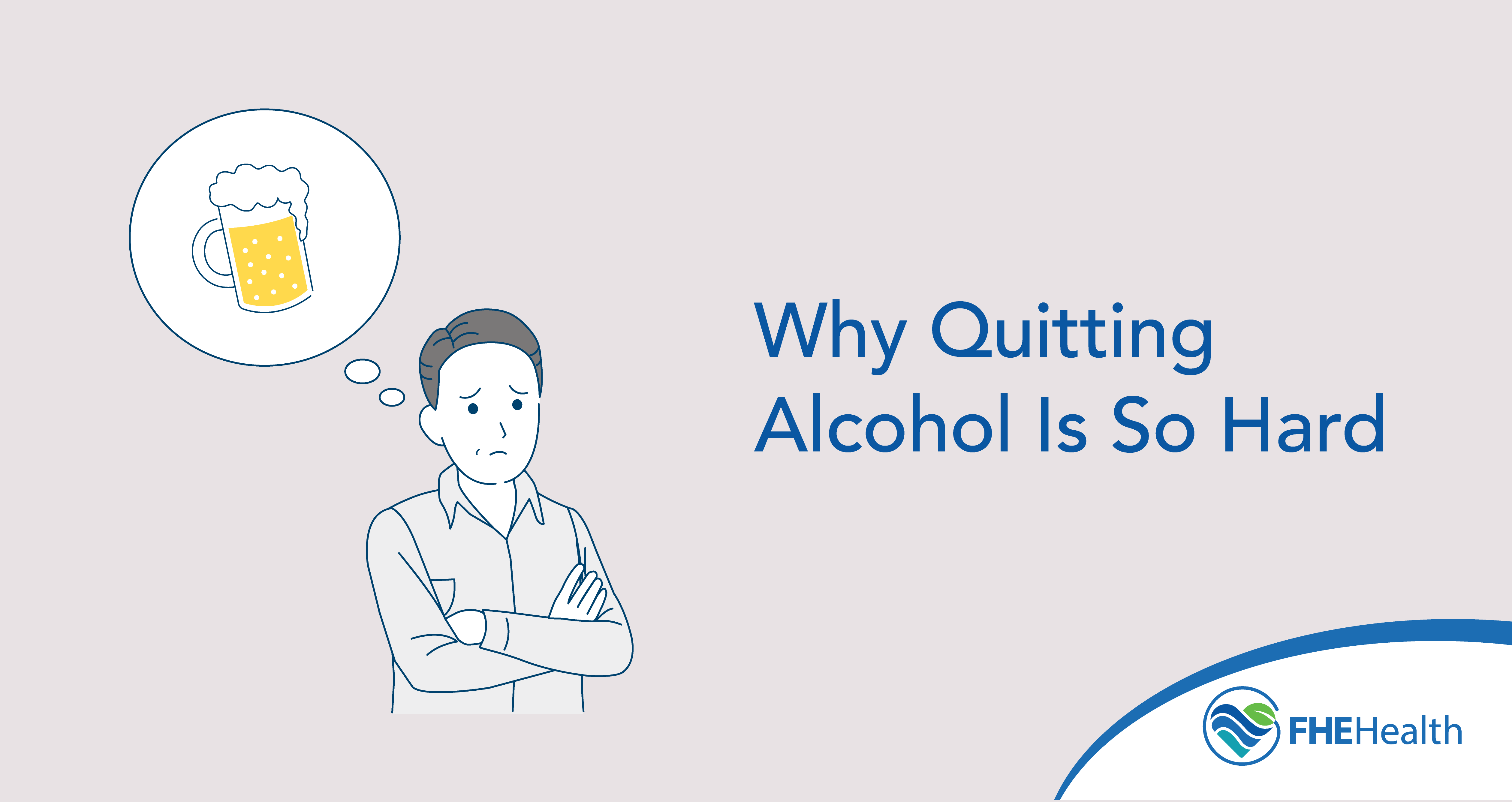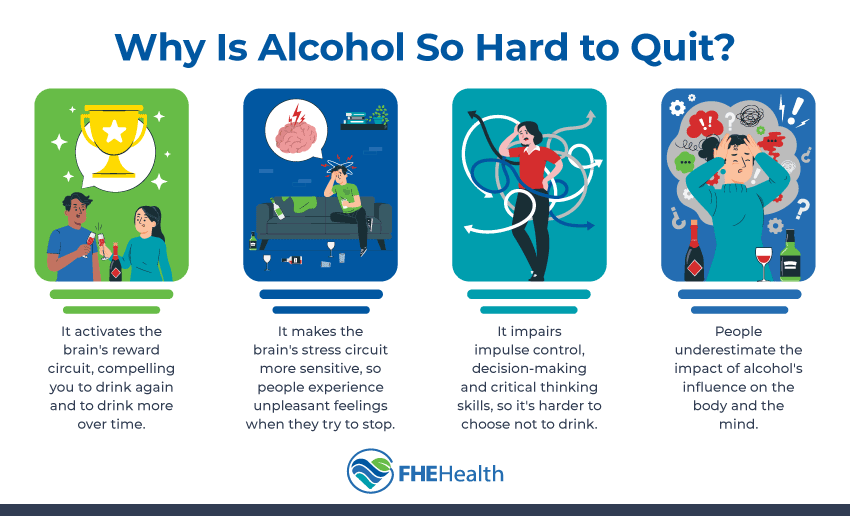
An estimated 62 percent of American adults report drinking alcohol at least sometimes. Of those who drink, 69 percent have had a drink within the last week. 19 percent think they drink more than they should. 10.2 percent of Americans aged 12 and older have alcohol use disorder (AUD), meaning they struggle to stop or control their alcohol use, even when it has detrimental effects on their life. Sometimes those with alcohol addictions struggle to quit, even if they want to.
The Challenges of Quitting Alcohol
People have difficulty quitting drinking for a multitude of reasons, including a physical and psychological dependence, an inability to resist triggers or cravings, and societal and cultural pressures to continue consuming alcohol. However, with the right supportive team and treatment plan, achieving long-lasting sobriety is possible.
Physical and Psychological Dependence
Quitting alcohol can be incredibly difficult, especially for someone who has been drinking for an extended period of time. This is because long-term alcohol use can actually change the structure of the brain and how it works. Part of this comes from alcohol creating a pleasurable effect when it’s consumed while simultaneously reducing negative feelings. This combination can make it difficult to quit.
Excessive alcohol consumption, when chronic, can give way to two levels of dependence, the physical and the psychological. Withdrawal symptoms can then set in, making it harder to quit:
- At the psychological level, the mind can become dependent upon alcohol to alleviate anxiety and negative feelings. When the individual stops drinking, an increase in those symptoms can make them feel like they need to drink. They may also feel agitated, irritated or like they can’t feel pleasure.
- On the physical level, chronic alcohol use suppresses the central nervous system (CNS). Consequently, suddenly quitting drinking can “turn on” the autonomic nervous system, sending it into a higher gear. This reaction is commonly characterized by high blood pressure, tachycardia, excessive sweating, and shaking. Depending on the severity of the addiction, the excessive activity of the CNS can even result in seizures and hallucinations. For this reason, it can be dangerous for people to detox from alcohol without medical supervision.
The Role of Triggers and Cravings
Because alcohol is so effective at triggering the reward and relief centers in the brain, it’s easy to become conditioned to drink during difficult times. Additionally, it’s possible to associate certain places, activities, or other environmental stimuli with drinking if someone frequently consumes alcohol in certain settings or during certain times. This can trigger an automatic craving to want to drink in those settings, even if someone is sober. Some people may find these cravings irresistible, resulting in relapse.
Sometimes, the urge to drink seems to pop up for no reason, but it’s commonly because of some sort of internal or external trigger. External triggers are situational and outside of yourself. For example, they’re the people, places, things, or times that are reminders of drinking alcohol. Someone who always drinks during football games may find themselves feeling the urge to reach for alcohol whenever they sit down to watch a game. Or, someone who drank wine with dinner each night might find that sitting down for dinner triggers the urge.
Internal triggers are those within yourself. They’re thoughts, emotions, and physical sensations that evoke urges to drink alcohol. For example, someone grieving might be more inclined to have a drink if they’ve previously used alcohol as a coping mechanism.
Getting to know and recognizing one’s cravings is a central part of achieving lasting sobriety. If you have been struggling with your alcohol consumption, consider tracking when you feel the urge to drink. Write down what’s going on and how you feel or what you’re thinking about when you feel the impulse. With time, it’s possible to identify common triggers, so that you’re better able to avoid or cope with them.
Social and Cultural Pressures to Drink
Quitting alcohol can be especially difficult when societal and cultural norms encourage its consumption. Alcohol usage is prevalent worldwide and has been across a range of cultures. Germany is well-known for its beer consumption, while in Japan, it’s normal for people to drink sake together after a long day at work.
In the United States, drinking is very prevalent, though the preferred drinks can vary. People face a lot of pressure to drink alcohol. It’s commonly served at restaurants, parties, and regularly with meals at home. Going out for drinks on the weekend or enjoying alcohol during holiday celebrations is the norm for many people, which can make quitting even more difficult. Someone attempting to get sober might find themselves invited to Happy Hour by colleagues after a successful business meeting. They might go to a family holiday celebration and be surrounded by people drinking wine or mixed drinks.
It can be hard to abstain from alcohol when everyone else has a drink. It can be even harder for someone to abstain when they’re offered drinks by people who either don’t know they’re struggling with AUD or who think one or two drinks won’t be a big deal because they think everyone has a few drinks now and then.
Strategies for Achieving and Maintaining Sobriety
Achieving and maintaining sobriety is possible, but it takes hard work and dedication. Like other chronic health issues, AUD is a lifelong condition that requires ongoing management. Usually, the first step to getting sober is enrolling in a treatment program. Typically, it should include four levels of care:
- Intensive Inpatient: Intensive inpatient treatment involves 24-hour medical supervision. It often occurs in a clinical or hospital setting. It’s recommended for those who require additional supervision while detoxing, such as those at an increased risk for serious withdrawal symptoms or those with chronic medical conditions that may complicate the detoxification process. These programs include regular therapeutic sessions and support groups alongside continuous medical supervision.
- Residential: Residential treatment programs are a step down from intensive treatment. They’re still considered an inpatient treatment option, and patients engage in a structured schedule that includes individual and group therapies to help patients cope with their addiction.
- Intensive Outpatient: Intensive outpatient treatments are a step in between outpatient and inpatient care. Patients participate in several hours of treatment per week on a strict schedule, then return to their own homes after. They allow for more flexibility if the patient needs to be home with their family.
- Outpatient: Outpatient treatment is the least intensive, involving therapies that are scheduled around daily responsibilities. The patient gets care while attending work or school or managing family obligations.
Even after treatment, those with AUD still have to maintain their sobriety. Common methods proven effective include:
- Attending a Peer Support Group: Peer support groups like Alcoholics Anonymous provide a supportive environment where people struggling with AUD can talk and encourage each other’s progress. Addiction support groups are associated with increased treatment retention and reduced rates of relapsing.
- Avoiding Triggering Situations: By avoiding situations that trigger the urge to drink, individuals can better protect their sobriety. Someone who struggles with their sobriety if they’re around others drinking, for example, would avoid bars, pubs, or social gatherings where alcohol is served.
- Finding Ways to Manage Cravings: Cravings can hit even years after taking your last drink. In most cases, they pass relatively quickly, but waiting for them to subside can feel like a lifetime. Choose substitute behaviors, like chewing gum, drinking water, or going for a quick walk around the block.
Quitting Alcohol Is Hard—But Not Impossible
If you have difficulty quitting drinking, you’re far from alone. You also don’t have to get through it alone. The challenges of alcohol dependency make achieving sobriety tough, but with the right treatment and support, it’s possible to recover.
For help in that journey, call us at 1-844-423-3185. Our team of trained professionals has helped many people achieve recovery through evidence-based clinical practices and customized strategies tailored for their needs.







